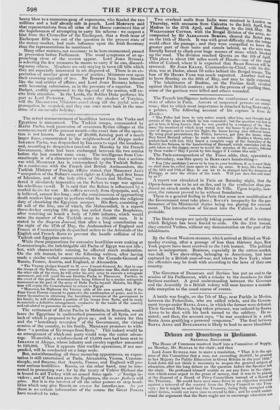The actual commencement of hostilities between the Turks and Egyptians
is announced. The Turkish troops, commanded by Manz nicht', took possession of seventeen Syrian villages at the commencement of the present month—the exact date of the opera- tion is not known. An army of 20,000, forming part of a much larger force, concentrated in the neighbourhood of Aleppo under Inumnst Paella, was despatched by IBRAIIIM to repel the invaders; and, according to despatches received on Monday by the French Government, shots had been exchanged between the two armies before the last courier came away. The intelligence from Con- stantinople is of a character to confirm the opinion that a serious war with Mmtemer Am is contemplated by the Turkish Sultan. At a conference with the French and British Ambassadors, the Turkish Minister of Foreign Affitirs stated, that MEHEMET Ards "usurpation of the Sultan's sacred rights as Caliph, and first Iman of Islamism, and of the holy cities of Mecca and Medina," ren- dered it absolutely imperative on the Sultan to wage war against his rebellious vassal. It is said that the Sultan is influenced by a morbid desire for war. He suffers severely from dyspepsia, and, it is believed, cannot live long ; and the consciousness of approaching death renders him eager to perform what he considers the religious duty of chastising the Egyptian usurper. His fleet, consisting of 35 sail of the line, one of which, the Mahmoudieh, is a superb three-decker carrying 133 guns, has sailed from the Bosphorus, after receiving on board a body of 7,000 infantry, which would raise the number of the Turkish army to 105,000 men. It is stated in the Smyrna Jimrnal, that after a long consultation on the night of the 27th of May, the Ambassadors of England and France at Constantinople despatched orders to the Admirals of the English and French fleets to prevent the hostile collision of the Turkish and Egyptian navies.
While these preparations for extensive hostilities were making at Constantinople, the indefatigable old Pacha of Egypt was not idle ; but, with characteristic cunning, he affected much moderation. On the 4th instant, he sent the following written, after having made a similar verbal communication, to the Consuls-General of Russia, France, Austria, and England, at Alexandria.
"The Viceroy pledges himself to M. — Consul-General, &c. that in case the troops of the Sultan, who crossed the Euphrates near Bir, shall retire to the other side of the river, he will order his own army to execute a retrograde movement, and will recall his son Ibrahim Pacha to Damascus. Further, in the event of this pacific demonstration being Mowed by a similar retrograde movement on the part of the army of Hafiz Pacha beyond Malatia, his High- ness will enjoin the Generalissimo to return to Egypt. "Moreover, his Highness the Viceroy adds of his own accord, that if the Four Great Powers consent to guarantee the continuation of peace, and to in- terest themselves in obtaining the hereditary reversion of the government to his family, he will withdraw a portion of his troops from Syria, and he ready to conclude a definitive arrangement, conducive to the wants of the country and calculated to guarantee its security."
The retirement of HAFIZ Pacha to Malatia, in Roumelia, would leave the Egyptians in undisturbed possession of all Syria, not an inch of which is proposed to be given up ; and in return for this and the "hereditary reversion" of the Government, the virtual cession of the country, to his family, MEHEMET promises to with- draw "a portion of his troops from Syria." This indeed would be an arrangement of' which one party would reap the entire advan- tage. Meanwhile, a reinforcement of 15,000 men had been sent to IBRAHIM at Aleppo, whose infantry and cavalry together amounted to 120,000. Thus it appears that warlike operations, if not sus- pended, will be conducted on a large scale. But, notwithstanding all these menacing appearances, an expec- tation is still entertained at Paris, Alexandria, Vienna, Constan- tinople, and Smyrna, that Austria, France, and England will pre- vent serious hostilities. Russia, on the other hand, may be inte- rested in promoting war ; for by the treaty of Unkiar Slielessi she is bound to aid Turkey with an armed force again. at foreign in- vaders; and if IBRAHIM pass the Euphrates, the cuee iiederis will arise. But it is the interest of all the other powers to stop hosti- lities which may give Russia an excuse for interference. As yet there is no certain information of the course the Great Powers have resolved to take. Two overland mails from India were received in London on Thursday, with accounts from Calcutta to the 24th April, from Madras to the 27th April, and Bombay to the 10th May sir Wrixotionnr COTTON, with the Bengal division of the army, ac- companied by Sir ALEXANDER BURIqES, cleared the Bolan pass on the 18th of March. It was with great difficulty that the troops could effect the passage ; and they were compelled to leave the greater part of their tents and camels behind, as the men were literally forced to climb over huge masses of stone which blocked up the road. The division reached Quetta on the 5th of April. This place is about 100 miles south of Handa—one of the royal cities of Cahoot, where it is expected that SHAH SOOJAII will be crowned. Sir Joini KEANE, Commander-m-Chief, with his divi- sion, was at Dadur, about 70 miles behind the Bengal troops. The loss of Sir IIENRy PANE was much regretted. Another mail was to leave Bombay on the 20th of May, and may be daily expected.
The inhabitants of Bushire, on the Persian Gulf, revolted against their British masters ; and in the process of quelling them, some of the garrison were killed and others wounded.


























 Previous page
Previous page